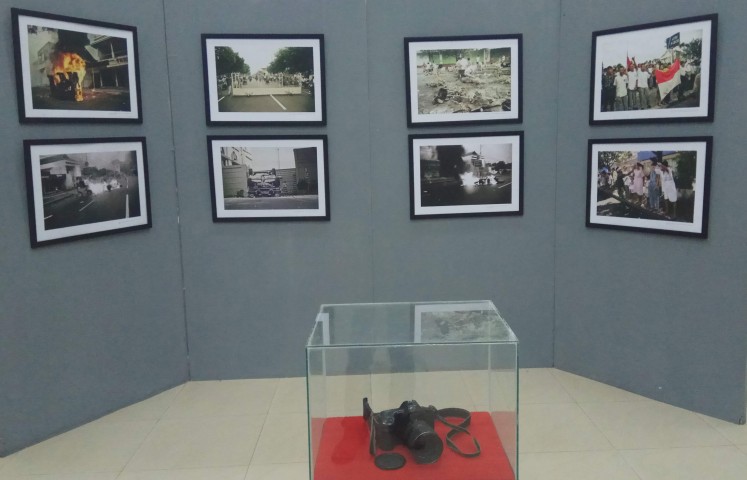Popular Reads
Top Results
Can't find what you're looking for?
View all search resultsPopular Reads
Top Results
Can't find what you're looking for?
View all search resultsTanah Abang: A haven for Padang food lovers
Food fiesta: An employee of restaurant Uni Lis displays a portion of satay and rice cake with a generous helping of red chili sauce that sells for Rp 15,000 (US$1
Change text size
Gift Premium Articles
to Anyone

F
span class="caption" style="width: 298px;">Food fiesta: An employee of restaurant Uni Lis displays a portion of satay and rice cake with a generous helping of red chili sauce that sells for Rp 15,000 (US$1.60) in Tanah Abang, Central Jakarta. Some restaurants in the city that sell Minang food are still holding on to their original recipes. (JP/Indah Setiawati)Minangkabau living in Jakarta are lucky to have a plethora of establishments offering food that reminds them of home because of the numerous food stalls and restaurants across the city that offer their kind of home cooked meals.
Food stalls offering the West Sumatra ethnic group’s cuisine usually call themselves Padang restaurants.
Padang is actually the capital city of West Sumatra province and as they all serve Minangkabau food back in the province, no restaurant calls itself a “Padang restaurant”.
Some streets in Jakarta are especially known for the Minangkabau cuisine on offer, such as Jl. Kramat Raya and Jl. Bendungan Hilir in Central Jakarta, which are lined with warung padang (Minang food stalls) that sell specialities such as nasi kapau (a mixed rice dish).
Many restaurants, including franchises, offer fusion menus to attract non-Minangkabau customers.
Masni, a trader from Ulakan in Padang Pariaman, West Sumatra, said that after visiting many places famous for their Minangkabau cuisine his heart was captured by a food court at Blok F in Tanah Abang shopping center in Central Jakarta.
“The food [there] fits my taste, it is all delicious. I have not found such consistency at any other location,” he told The Jakarta Post.
Minangkabau food court at Block F in Tanah Abang may be less well known, but they have won the hearts of Minangkabau people across the city, many of whom are traders in Southeast Asia’s largest textile market.
“I have been selling food here since 1998. I remember that on my fifth day Jakarta began rioting, which inspired me to name our stall ‘Reformasi’,” said Asnizal, 56.
Located across from Block B and Block A, Block F’s building is older and less appealing than the two sister buildings. The elevator in the building does not work, so the only way to reach the food court on the fifth floor is to climbing the stairs. After passing four floors that are packed with shops, you will find a dark and creepy parking area. Climb through the rusty stairs to find the food court, which is showered by bright lights and crowded with people.
The food court is filled with a Minangkabau cuisine ambience with large banners depicting traditional rumah gadang (big house), Minang-kabau menus and the food stalls’ names. During lunchtime this place is as busy as the market itself.
People are crammed along tables in front of the stalls while waiters and waitresses compete with conversations to greet new customers and shout orders to their fellows standing in readiness at the back of the glass stall.
Asnizal, who owns three other stalls in separate locations, said her customers included politicians such as Amien Rais and Prabowo. The mother of five from Batusangkar city was proud to show a picture of her with comedian Tukul Arwana taken when she catered for a party at his house.
“I got the recipes from my mother. I grew up helping her cook in Bendungan Hilir,” she said, adding that she supervised all the cooking in her kitchen in Kebayoran Lama, South Jakarta.
Another must try Minangkabau cuisine in the Tanah Abang area is satay and soto restaurant Uni Lis located on the second floor of the Kebon Jati market building.
The old blue building is located on the junction heading to Tanah Abang shopping market from the Textile Museum on Jl. KS Tubun.
The owners of the stall are husband and wife team Muhammad and Ratna Wilis, who have been selling satay there since 1991. The thick and delicious red sambal served with their satay is hot but not too spicy.
“We are old now. I recently asked my eldest daughter to quit her job for a private company to continue this business. Her salary is only Rp 6 million [US$618] a month, while here our daily income is Rp 1 million,” Muhammad said, adding that his customers include politicians and high ranking police officers.









